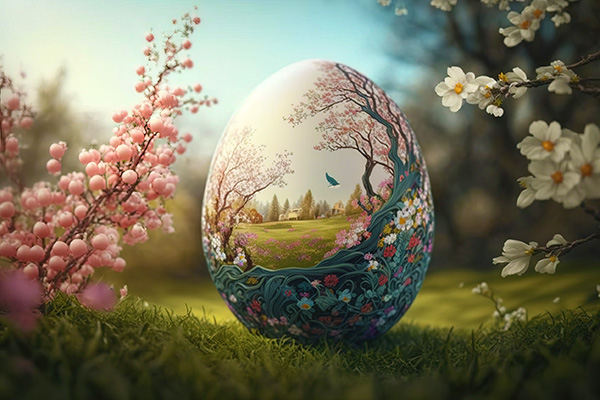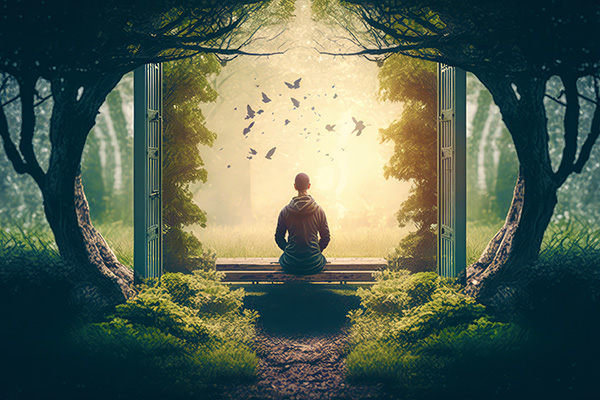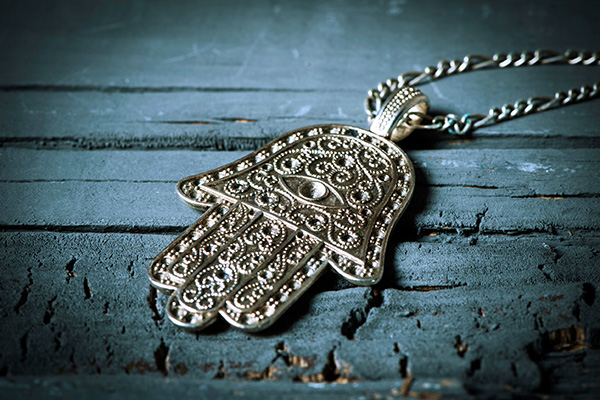spiritual self-care
Revitalize Your Life With A Spiritual Spring Clean
 The spring season is upon us and with it comes a fresh energy of renewal and rebirth.
The spring season is upon us and with it comes a fresh energy of renewal and rebirth.
Very often at this time of year people do a “spring cleaning” of their homes and workspaces, and for good reason. On a spiritual level, we have been moved by the powerful influence of this vibrant seasonal energy since the beginning of time.
As the light of the sun returns and the air begins to warm, we feel on a deep level the cycle of rebirth and the return of fertility to the earth that sustains us, just as our ancestors did through the ages. It inspires us to make room in our lives for this invigorating energy of renewal.
The ancients held the spring in high regard, attributing significant spiritual and symbolic meanings to the season. Although beliefs varied across different cultures, they mostly centered around themes of renewal, fertility, rebirth, and celebration.
In Ancient Egypt, for example, spring was closely associated with the annual flooding of the Nile, which brought fertile silt to the fields. The Egyptians celebrated the festival of Sham el-Nessim, marking the beginning of spring, which was believed to bring rejuvenation and health.
Spiritual Maturity Is A Lifelong Journey
 What does spiritual maturity mean to you? Every time I ask someone this question, I get all kinds of different answers.
What does spiritual maturity mean to you? Every time I ask someone this question, I get all kinds of different answers.
A Baby Boomer I asked said it meant going to church, donating to charities, studying the Bible, and following the Ten Commandments.
When I asked a Gen Z client, she said it meant minding your own business and not caring what others think of you because it is none of your business what they think. She also said she was a Wiccan and didn’t believe in wishing negative energy on others, because she knew it would only come back to her if she did.
I recently asked four people at a social gathering, and they had different opinions on the subject. They were in their 30s and 40s and had a young teenager with them. Interestingly, one thing they all agreed on was that it is spiritually mature to create healthy boundaries with family and friends for your own mental and spiritual well-being. One woman shared, for exxample, that if she hadn’t stopped hanging out with one of her friends, she would have hit rock bottom emotionally.
“I just could not put up with the way she treated me. I used to spend a lot of time stressing about the things she would say and do. I was always overthinking every toxic interaction with her, and our so-called friendship was not good for my mental state,” she explained. “So, for me, spiritual maturity is walking away from those who bring you down.”
Energy Imprint, Energy Cord, Or Entity Attachment?
 In my work, I often encounter people who are experiencing phenomena that are negatively affecting their energy field, causing them to suffer a loss of physical, mental, emotional, and spiritual health and well-being.
In my work, I often encounter people who are experiencing phenomena that are negatively affecting their energy field, causing them to suffer a loss of physical, mental, emotional, and spiritual health and well-being.
Usually these problems are simply due to their own negative thinking, or external negative energy imprints or residues that their aura has picked up from toxic people or environments. In many cases, it can be due to the energy cord of a dysfunctional or unhealthy romantic relationship or other types of energy cords with family, friends, or co-workers that are contaminating or draining their personal energy and vitality.
In some cases, however, these negative energy influences have a far more sinister origin that the “carrier” or victim is rarely aware of, while it is destroying their well-being and wreaking havoc in their lives.
The problem is that many people do not understand the difference between negative energy imprints, energy cords, and evil entity or spirit attachments. In my experience, the confusion is mainly due to the fact that the effects these three categories of negative energy phenomena have on people are often similar, leading to misinterpretation of the source or cause of these influences and disturbances.
Finding Your Silent Space Within
 Finding our silent space within is the essential spiritual practice. Cultivating a sense of inner stillness, mindfulness, and presence is crucial to any spiritual, metaphysical, or esoteric practice, as it allows for a deeper connection to your higher self, the universe, and the divine.
Finding our silent space within is the essential spiritual practice. Cultivating a sense of inner stillness, mindfulness, and presence is crucial to any spiritual, metaphysical, or esoteric practice, as it allows for a deeper connection to your higher self, the universe, and the divine.
The silent space within is the inner connection point to our spirit or soul — the part of our being that is eternal and transcendent. This relationship is fundamental to most spiritual, religious, and esoteric traditions, which often describe the silent space within as a portal or bridge to a deeper understanding and connection with the soul, the divine, or the universal consciousness.
In many traditions, cultivating the silent space within is considered essential to achieving enlightenment or spiritual liberation — the realization of one’s true nature as soul or spirit, beyond physical and mental limitations. This realization of inner silence is our awakening to the eternal aspect of our being.
A concept used in various spiritual, meditative, and mindfulness practices, the notion of a silent space within symbolizes the inner sanctuary where one can retreat to find inner peace and strength, clarity, and a sense of centeredness, regardless of external circumstances. It is where we feel a deeper connection to something greater than ourselves, which is central to any spiritual path.
Energy Self-Care Strategies For Empaths And Sensitives
 Empaths and highly sensitive people (HSPs) often feel drained by other people and certain environments due to their inherently sensitive nature and the way they interact with the world around them.
Empaths and highly sensitive people (HSPs) often feel drained by other people and certain environments due to their inherently sensitive nature and the way they interact with the world around them.
We face unique physical, mental, emotional and spiritual challenges because of our innate ability to deeply feel and absorb the thoughts, emotions and energies of those around us. While our sensitivity is a blessing and a gift to the world, it can also become a curse through overwhelming experiences of empathic overload and energy depletion.
Energetic self-care is therefore of paramount importance to the sensitive person. Every empath or HSP should adopt a daily routine of energetic self-care practices designed to cleanse, protect and rejuvenate their aura or personal energy field.
Mastering these practices is not only beneficial to our health and well-being, it’s essential for maintaining holistic balance, protecting our mental health in particular, and nurturing our deep connection to the world and those around us.
As empaths and HSPs, we can manage our energy more effectively by employing several strategies that help us maintain our energetic well-being, while navigating a world that can often feel overwhelming. The following are essential tools and strategies that can empower empaths and HSPs to thrive in their sensitivity and turn their deep empathy into their greatest strength through effective energetic self-care:
A Foundation Of Well-Being For The Psychic Medium
 I recently enrolled in a year-long mediumship development course. One of the introductory topics we have been exploring in the course material is the importance of self-awareness and recognizing what affects your personal and spiritual well-being.
I recently enrolled in a year-long mediumship development course. One of the introductory topics we have been exploring in the course material is the importance of self-awareness and recognizing what affects your personal and spiritual well-being.
This is crucial in psychic and mediumship work, as various factors can affect one’s overall well-being and ability to perform optimally during a reading. As a psychic medium, you have an obligation to provide the best possible guidance to your clients by taking good care of yourself.
And even if you follow various self-care practices and know what you need to do to maintain your well-being, there will be days when you simply do not feel your best. Therefore, it is also important to be self-aware and able to recognize when you are out of alignment with the source of your being or feeling “out of sorts.”
The mediumship course explores several interesting topics and aspects of self-awareness beyond what is generally experienced on a daily basis. For example, negative energy in your environment, tension and conflict in relationships, and worries about people, pets, or finances. It is also important to recognize that we are all unique and that what may significantly affect one individual may not have the same effect on another.
The Mystical Symbolism Of The Hamsa
 The well-known Hamsa symbol has a rich tapestry of esoteric meaning that spans several cultures and religious traditions, including Islam, Judaism, and Christianity. It is commonly used as a protective amulet, offering protection from the evil eye, as well as a talisman or good luck charm, bringing its wearer blessings in the form of happiness, health, and fortune.
The well-known Hamsa symbol has a rich tapestry of esoteric meaning that spans several cultures and religious traditions, including Islam, Judaism, and Christianity. It is commonly used as a protective amulet, offering protection from the evil eye, as well as a talisman or good luck charm, bringing its wearer blessings in the form of happiness, health, and fortune.
The Hamsa is also known as the Khamsa, Hamesh, the Hand of Fatima, the Hand of Miriam, or the Hand of Mary. The names “Hamsa” and “Khamsa” both refer to the number five in Arabic while “Hamesh” means five in Hewbrew, all symbolizing the five fingers of the hand.
In Islamic tradition, this famous esoteric hand is named after Fatima al-Zahra, the youngest daughter of the Prophet Muhammad and his first wife Khadija. Fatima is known by many titles in Islamic tradition, of which al-Zahra (meaning “the Radiant One”) is one of the most prominent. Her life, devotion to family and faith, and moral integrity are admired and serve as an inspiration to Muslims around the world.
In Jewish culture, the hand symbol is named after Miriam, the sister of Moses and Aaron, who was a prophetess and is an important figure in Judaism. In some Christian contexts, it is also known as the Hand of Mary, although it is less commonly referred to by this name. In this instance it is associated with Mary, the mother of Jesus, who is revered for her purity, grace, and maternal protection.